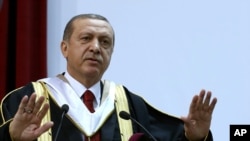As a staunch backer of Syrian rebels seeking to overthrow President Bashar al-Assad, Turkey recently dispatched tanks and soldiers to Iraq without Baghdad’s permission, ostensibly to protect Turkish forces training Iraqis fighting Islamic State militants.
While Ankara insists it remains committed to respecting a Westphalian foreign policy of respecting its neighbors' territorial integrity, recent actions indicate it has abandoned the decades-long protocol of non-interventionism.
"What we do in Syria, helping some militias trying to topple Assad, [and] what we are doing in Iraq, is quite an interventionist policy, based on values or, in certain cases, national interest," said Aydin Selcen, a retired Turkish diplomat who opened Turkey's first consulate in Iraqi Kurdistan.
"But traditionally, Turkish foreign policy was quite legalist and 'Westphalian' in nature," he added, citing the principle of international law that says every country has sovereignty over its territory and domestic affairs.
Some observers see Ankara's strategic shift as a result of concurrent diplomatic crises with Iraq and Russia, and its tensions with Iran. For generations, Turkey's policy was to avoid intervention in the affairs of its neighbors. But with the region in crisis, Ankara is taking a more assertive foreign policy approach.
While Turkey’s traditionally non-interventionist guidelines date back to Mustafa Kemal Atatürk, founder of the Turkish republic, leaders of the country's ruling AK Party has viewed non-interventionism as a weakness, especially with the region in crisis. But According to Semi Ides, a political columnist for Turkey’s Cumhuriyet newspaper, Ankara's increasingly interventionist policy is proving counterproductive.
"Now the [AK Party] has no other way [but] to try and backpedal," he said. "But it cannot do that because of its domestic audience, so it has painted itself into a corner."
Under international pressure, Ankara has been forced to withdraw most of the forces it recently deployed to Iraq.
Observers point out that an increasingly assertive Turkey threatens to revive historical memories of its imperial Ottoman past, when it ruled much of the region. Retired Turkish diplomat Selcen says even Ankara's international allies are now concerned.
"I am not quite sure whether we are seen as a reliable or credible partner anymore," he said.
With the region in crisis, government supporters argue, Ankara has to protect its interests and security. But some say Turkey's more interventionist foreign policy ultimately may prove self-defeating, by isolating it internationally at a time when it needs allies most.













